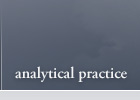Searching for Reality Beyond the 'Wow' Moment
by robert aziz
In reading the case examples presented in The Syndetic Paradigm: The Untrodden Path Beyond Freud and Jung there will no doubt be some very powerful 'wow' moments. I myself certainly had a few when I was writing The Syndetic Paradigm. Such moments inspire and as much as I have at times enjoyed experiencing them with others I am now less inclined to do so. Why? Because all too often we attach to these wow moments in a manner that causes us to stop short of seeing that of which they are but an expression. All too often what has the potential to serve as a point of access to the depth meaning of self-organizing Reality becomes a mere form of entertainment.
... Continued
The Venerable Chan (Zen) Master Hsu Yun (1840-1959)—the most highly regarded Chan Master of the modern period in China and of whose enlightenment experience I wrote in C.G. Jung's Psychology of Religion and Synchronicity (pp. 140-144, 158)—told the attendees of a two week Chan session in 1953: "Although we know quite well that Mind is Buddha, we are still unable to accept this as a fact. … Our fundamental self-nature and the Buddha do not differ from each other. It is only because of our perverted thinking that we are (still) not liberated. So the Buddha is still Buddha and we are still ourselves." (Lu K'uan Yu (Charles Luk), ed., trans. Ch'an and Zen Teaching, First Series, p.57)
Now at least one thing we should understand about Hsu Yun's statement is that the 'mind' to which he refers is not something that is situated between our ears. Similarly, the self-nature of which he speaks does not refer to our individual selves only. So what then we ask are the mind and self-nature beyond these strictly personalistic forms? As noted elsewhere in my writings, in contrast to the Jungian Paradigm, but here in alignment with Zen Buddhism, within the Syndetic Paradigm we move from a closed-system model of a self-regulatory psyche to an open-system model of a psyche in a self-organizing totality. Within the Syndetic Paradigm, in other words, in keeping with Zen Buddhism, the psyche or mind is regarded as being, not a strictly in-the-person phenomenon, but rather, coextensive with all of self-organizing Reality.
If, then, as we are understandably led to ask in keeping with Hsu Yun, we indeed have come to know through our observation and study of syndetic patternings that our minds are not separate from, but rather, coextensive with Reality, if we have indeed observed as individuals we are not separate from, but inseparably connected with, self-organizing Reality as a whole, why do we not accept this our relationship to Reality as a fact, as Hsu Yun puts it? The answer to that question brings us back to the problem of the 'wow.'
We do not because there is a vast difference between simply passively observing such a fact, on the one hand, and allowing it directly to inform our experience of life, on the other. In the case of the former, fact is readily reduced to entertainment, whereas in the case of the latter the transformative energies of fact seize us experientially. To truly accept as a fact what syndetic events tell us about our relationship to Reality, we must, therefore, move from a passive to an active or dynamic engagement with fact. To truly accept as a fact what syndetic events tell us about our relationship to Reality, we must reach beyond the wow and bring the consciousness attending these experiences to bear on our daily lives. We must reach beyond the wow and use the attendant consciousness directly to inquire into our lives. We know quite well, through our study of syndetic events, we are coextensive with self-organizing Reality, yet in the experiences, events and encounters of our everyday lives we are still, to paraphrase the Venerable Hsu Yun, unable to accept this as a fact. Inquire into this—Ts'an!






